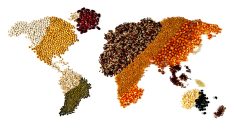The NAFTA negotiators have completed Rounds 3 and 4 and the progress has been glacial. What we don’t know is whether that is just as well, seeing we can’t be sure what will satisfy President Trump.
Round 3, held in Canada, was devoted to getting on paper the items the three countries could agree on. Evidently that included unspecified efforts to help small- and medium-sized businesses. All three countries maintained after Round 3 that progress had been made. Some pessimists concluded the snail’s pace and the lack of big news would doom negotiations when more difficult issues went on the table.
Read Also

A strategic approach to risk on the ranch
Given the increase in the value of livestock and the market volatility, we need to cover our risks. First,…
Round 4, held in Virginia, was when the negotiators submitted the texts of each country’s positions. That’s when the real worries set in. Some of the U.S. proposals were so far out there that the U.S. press blossomed with stories about the potential damage to the U.S. economy should President Trump attempt to pull the U.S. out of NAFTA.
So many people believed President Trump’s threats to pull out of NAFTA were just a negotiating tactic that the research was mostly slanted toward the benefits of a renewed agreement. Now, some of the researchers are looking at what would happen if the U.S. withdrew.
One research firm, ImpactECON LLC, predicts a net loss of 256,000 jobs in the U.S. 951,000 jobs in Mexico and 125,000 jobs in Canada over the next three to five years, according to the Wall Street Journal. Talk about an incentive for Mexicans to enter into the U.S. Overall, the firm’s analysis shows a U.S. reversal on NAFTA leads to a decline in real GDP, trade and investment in the U.S., Canada and Mexico. The motor vehicles and services sectors in all three NAFTA countries would decline, along with production of U.S. meat, food and textiles; Canadian chemicals and metals; and Mexican textiles, wearing apparel, electronics and machinery.
- Read more: Trade talks a dicey situation, Coyne says
- Read more: NAFTA negotiators trade barbs, agree on extension
The Journal’s editorial page was scathing on the possibility of a U.S. pullout.
“It’s hard to overstate the damage that ending NAFTA would inflict on the U.S. auto industry,” the Journal said.“Under NAFTA, companies tap the comparative advantages of all three markets and have created an intricate web to maximize supply returns.”
“NAFTA brings scale, it brings competitiveness, it brings efficiency [and] synergies between all three countries and it brings duty-free trade,” according to the American Automotive Policy Council. That group said the end of NAFTA would be equivalent to a $10 billion tax on the U.S. auto industry.
For several weeks, discussion has focused on the Trump administration proposals so likely to be rejected outright by Canada and Mexico that they had to be considered a poison pill, set up to give the administration an excuse to pull out of the negotiations. One is the proposed sunset clause that would end the agreement every five years unless all three nations agreed to renew it. Another would raise the NAFTA content of autos from the present 62.5 per cent to 85 per cent with 50 per cent being U.S. content. Another is trying to steer more public contracts to U.S. companies. Finally, the U.S. wants to scrap the current dispute resolution process.
“The odd feature of these proposals is that they seem designed to please no one,” Phil Levy, a Forbes contributor said.
He’s right. As the U.S. Chamber of Commerce’s Tom Donahue put it: “They have been met with strong opposition from the [American] business and agricultural communities, Congressional trade leaders, the Canadian and Mexican governments, and even other U.S. agencies.”
That was the viewpoint before the last weekend of Round 4, when the U.S. launched an attack on Canada’s dairy supply management system.
I’ll admit I’ve hardly ever run across a U.S. dairy farmer who can explain how the U.S. dairy marketing system works. When people down here talk about free market livestock, they’re talking about beef, hogs and chickens. So I’m not claiming a “holier than thou” position on our dairy pricing system. I’m simply noting that the Trump administration, and some U.S. dairy farmers, have taken umbrage to Canada’s reformulating of the classification for certain milk protein concentrates that shut U.S. dairymen out. Certain border area dairy processors were left without markets, notified dozens of dairy producers their milk was no longer needed and hard feelings resulted.
The administration countered with a proposal which requires the new price classification on concentrates be eliminated and transparency on Canadian pricing decisions — evidently including Canada’s supply managed programs, import restrictions and milk price setting, according to Politico’s Morning Agriculture, October 16, 2017. I’m not sure how many truckers are required to move milk and dairy products around Canada but the story said 35,000-40,000 teamsters are involved and they are not happy with what they termed a “full assault on Canada’s supply management system.”
The U.S. team also has made “seasonal anti-dumping proposals” to Mexico that its officials said would never fly. If they were enacted, Mexico would expect other industries to request for seasonality with grains, soy, corn, meat and all products.
Gary Hufbauer, a senior fellow at the Peterson Institute for International Trade, told the Associated Press that while President Trump could probably legally pull the U.S. out of NAFTA, congress could fight back. Congress could pass a resolution calling on the president to obtain congressional approval before pulling out or threaten to block the president’s agenda unless he gets congressional approval to pull out.
















